SUMMARY
This is AI generated summarization, which may have errors. For context, always refer to the full article.
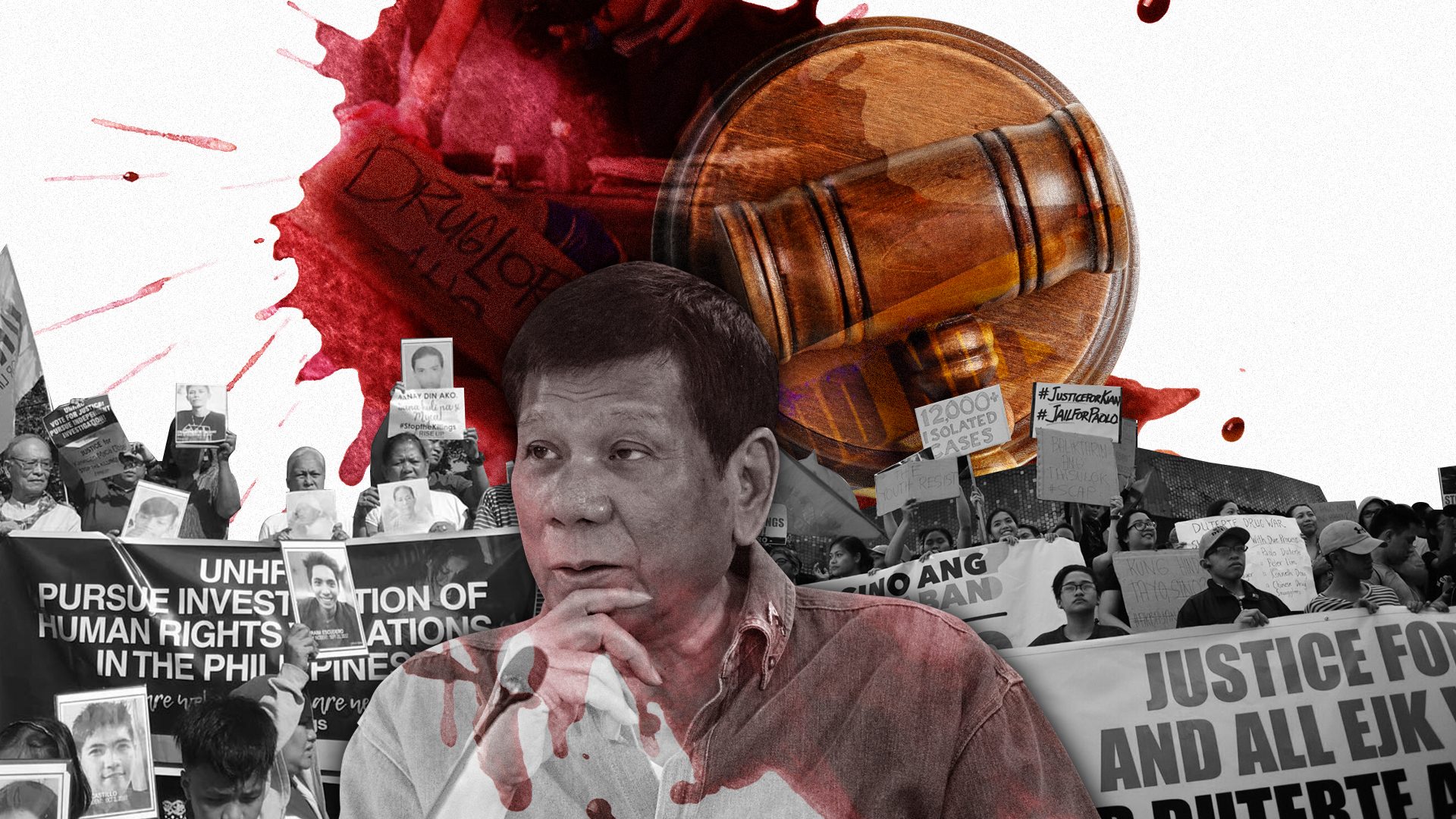
*Names have been changed for their protection
MANILA, Philippines – A series of unanswered text messages can be an inconvenience for some. But for mothers living in the poorest communities in a country whose president is out for blood, it can signal the start of an unending nightmare.
The family of Jose* knew something was not right when he didn’t reply to countless messages nor answer calls hours after he went out to drink with friends. It was in December 2018 – a few days before the beginning of Simbang Gabi (Dawn Mass), less than two weeks before Christmas.
On any normal day, Jose, the eldest of three children, would immediately reply to even the most mundane of text messages, especially from his mother.
“Hinding-hindi po ginagawa ng kuya ko iyon, at alam niya na may sakit ang nanay namin at mahina ang katawan,” Jose’s sister Nica* recalled. “Hindi talaga nakatulog ang nanay ko noong gabi na iyon kasi kabadong-kabado siya, parang may maling nangyayari.”
(My brother had never done that because he knew our mother was sick and weak. She wasn’t able to sleep that night because she really felt nervous, like she knew a bad thing happened.)
They didn’t need to look far to see what could happen to a man of Jose’s standing under President Rodrigo Duterte’s violent war on drugs. In their community alone, hundreds of men had been killed as they were drinking with friends, walking home, or even just standing outside their homes.
A couple of knocks on Nica’s door confirmed their worst fears.
“Papasok ako ng trabaho na may kumakatok sa bahay namin. May isa na nakakilala sa kuya ko na nakabulagta raw siya sa isang highway,” she said. (I was preparing for work when someone knocked on our door and told me that he saw my brother’s lifeless body on a highway.)
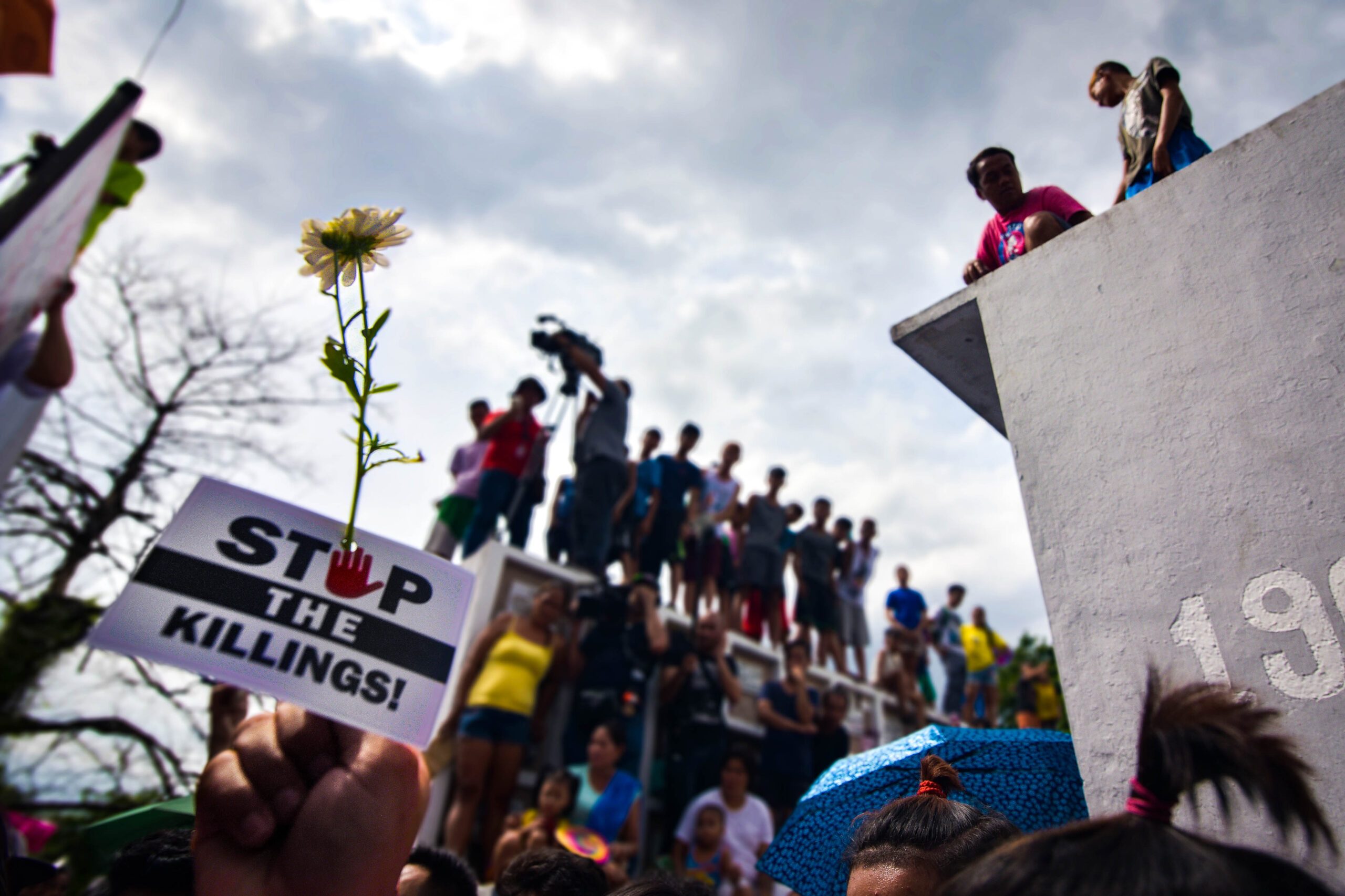
Questions left unanswered
Questions pertaining to police operations, which ideally should be answered by the state, are anything but welcomed under the Duterte presidency. Families, desperate to make sense of what happened, scramble for any information.
Knowing that your loved one was killed is already a tragedy on its own. But not knowing the circumstances of his death nor where his lifeless body was brought add another layer of grief and helplessness to an already traumatized family.
For hours, Nica waded through tears and unprecedented grief to find his brother Jose, going back and forth with authorities, from police stations to funeral parlors. The first police station she and her cousin went to said they didn’t know anything about the incident.
When they finally found Jose, in a funeral parlor not far from the scene of the crime, Nica fought hard not to break down. The state of his brother’s lifeless body – already stiff, she noticed – brought more questions than answers to what really happened.
She recalled families living where the incident allegedly occurred saying they were surprised to see dead bodies. Tricycle drivers in a nearby passenger terminal told her they should’ve heard it if a shootout, like what the police claimed, indeed happened.
If it was only up to Nica, she would’ve barged into the police station and demanded answers from police officers. But the more inconsistencies surfaced, the more scared her mother became. Not for herself, but for her remaining children.
“Ang dami naming tanong, pero sabi ng nanay namin, huwag na naming usisain pa,” she said. “Huwag na raw kami magtanong kasi baka raw mamaya sa kakausisa namin, imbes na isa lang ang anak niyang mamatay ay pati kami isa-isahin na rin.”
(We had a lot of questions, but our mother told us to stop inquiring. She told us to stop asking questions because she’s afraid that instead of losing just one child, she’d end up losing all of us.)
The same climate of fear continues to prevent Nancy* from knowing what really happened to her husband Lito* and getting justice for his senseless death.
In September 2016, barely three months into Duterte’s term, Lito was one of five people killed in what his neighbors called a massacre. He was reportedly just with friends outside when police allegedly fired at them for what witnesses claimed lasted three to five minutes.
“Ang asawa ko raw, dito nila tinira sa may bandang utak, sa sentido, kaya iyong bala lumusot sa ulo,” she recalled. “Noong nakarating na ako, doon ko nakita na ang daming butas, hindi lang sa ulo kasi pati katawan hanggang paa, meron.”
(They told me my husband was shot point blank in the head, in his temple, that’s why the bullet went through his head. When I arrived, I saw his body riddled with bullet holes. Not just on the head but down to his feet.)
Nancy wanted answers. She wanted to challenge the report that his husband, like so many other countless victims, fought back. Maybe she could even take the police to court, she thought. But she knew doing these would place her family, especially her children, into a more vulnerable position.
The presence of police and their visible firearms during her husband’s wake cemented this decision to wait for safer times.
“Minsan lalapit na lang sila na may hawak sila at lahat ng eskinita, sinisipat nila, kaya iyong mga nakikiramay, umaalis kasi siyempre natatakot sila,” Nancy recalled.
“May mga umiikot pa rin kahit hindi na nakaburol ang asawa ko. Hindi ko na lang pinapansin kasi iniisip ko na baka mag-TokHang na naman sila,” she added.
(They’d sometimes approach carrying a firearm, and even checked all the alleys, so even those who came to condole with us just immediately went home out of fear. Even after he was buried, we’d still see these men roaming around, but I just ignored them because maybe they’d just go after another person.)

State-sponsored killings, stories for safekeeping
Like Nancy and Nica, there are thousands of families who want justice for their loved ones killed in Duterte’s violent war on drugs, but are burdened by long-running issues, such as lack of access to police reports and harassment.
From July 1, 2016 – Duterte’s first day as president – to November 2018, a month before Jose was killed, at least 5,050 people had already died in police anti-illegal drugs operations, according to government data. By February 28, 2022, the number had grown to 6,235 people.
This number does not include victims of vigilante-style killings, which human rights groups estimate to be between 27,000 and 30,000.
The police could be underreporting the numbers. Data obtained by Rappler in September 2020 showed that 7,884 suspected drug personalities had been killed by the police since Duterte assumed office until August 31, 2020.
Initiatives for Dialogue and Empowerment through Alternative Legal Services (IDEALS), in a 2021 study, concluded that the killings were “state-sponsored murder.”
Human rights lawyer Carlo Brolagda of IDEALS has helped document over a hundred cases of these extrajudicial killings under Duterte’s war on drugs. His organization, meanwhile, has documented at least 700 cases.
With the state at the forefront of these killings, it’s inevitable that families would feel afraid to go out with their stories and hold the government accountable.
“Ang hirap na hanapin and sabihan sila na (It’s hard to find and tell them that) we’re in a safe space to come forward and tell your stories because there’s a legitimate and real fear of an imminent danger that can come to them,” Brolagda said.
“It’s a legitimate fear in the communities because these killers, hindi naman nahuhuli (they don’t get arrested) so they’re still roaming around, that’s why it’s not hard to imagine what could happen next [to these families],” he added.
Out of the thousands killed since 2016, only one case led to a conviction so far – the killing of 17-year-old Kian delos Santos in 2017. There is still no significant update from the much-boasted inter-agency drug war review panel, which critics said was used to shield the drug war from further international scrutiny. (READ: In Duterte’s drug war, justice is ‘nearly impossible’)
Meanwhile, Duterte himself said in January 2022 that he would “never, never apologize for the death of those bastards.”
With all things considered, it is not hard to see why finding justice, or at least jumpstarting the process towards it, is almost impossible under the Duterte administration. A Rappler investigation earlier found that families had been forced to lie about the circumstances of their loved one’s death.
Other families, according to Brolagda, already resolved to wait until Duterte’s term ends on June 30, 2022.
“They just want to really tell someone what happened to them while others are content with documenting their stories for safekeeping and for future justice mechanisms,” he said.
These future justice mechanisms cover domestic and international instruments, including the International Criminal Court (ICC), whose Office of the Prosecutor began its formal investigation into drug war killings. It has since temporarily paused the probe as a matter of procedure, but not without asking the Duterte government to prove that it was genuinely investigating the killings.
But the road to possible ICC proceedings is not easy, most especially with the firm decision of the current administration to not cooperate.
“Naiinis ako at nagagalit na pati sa ICC, tinatanggalan kami ni Duterte ng karapatan para lumaban para sa mahal namin sa buhay,” said Yolly*, whose brother was killed in 2018. (I’m so irritated and angry that Duterte is still stripping us of our right to fight for our loved ones even at the ICC.)
Worries, fears post-Duterte
For Commission on Human Rights (CHR) Commissioner Roberto Cadiz, the quest for justice of the families highly depends on how resolute the next president would be in fighting the culture of impunity Duterte will leave behind.
The next administration should genuinely investigate and hold accountable those responsible for the trail of blood since 2016. He said that a chief executive who “has scant regard for human rights will inevitably have policies tending to contravene the rule of law.”
“The succeeding administration will determine whether extrajudicial victims will find justice or whether their cases will continue to be ignored,” Cadiz said.
One of the most important things that should happen post-Duterte is the creation of safe spaces where families could come forward. In this ideal world, they will not be afraid of repercussions regardless of who they talk to – human rights workers who tirelessly document killings or even police investigators themselves.
An administration that will put a premium on prosecuting people behind the killings can cultivate these safe spaces, according to Brolagda.
“If we can start to show that the institutions are functioning and laws are actually working, and that justice is attainable, then more people would start coming forward because then they will start to see that there is an environment for us to come forward and for us tell our stories and seek justice,” he said.
But the platform of survey frontrunner Ferdinand “Bongbong” Marcos Jr. gives little to no confidence that he will prioritize – let alone allow – justice to be given to the victims. While he said he would focus on the “prevention side” of the war on drugs, the dictator’s son in October 2021 also said he’d most likely shield it from international scrutiny, including the ICC.
This brings heightened fear for many, including community organizers who have had to navigate not just bureaucratic processes to help families, but also dodge harassment and threats from state forces.
Gilda*, who has assisted widows and mothers for many years, already feels scared to even dangle her identification card while doing field work. She can’t count the many times she’d had to cease discussions with family members just to pry them away from the eyes of police in their communities.
“Nakakatakot na itong eleksiyon na ito, kung maluklok na naman ang mapang-abuso, ano na mangyayari sa seguridad natin at ng mga pamilya na gustong makamtan ang hustisya? Subject na naman ba sa TokHang? O mas damihan pa nila?” she said.
(This election is really scary because if we’re going to elect an abusive leader again, what will happen to our security and the families who want justice? Will they subject these people to TokHang again? Are they going to kill even more people?)
On May 9, more than 65 million registered Filipinos are expected to flock to polling precincts to vote for the next president of the Philippines, who will spearhead the possible transitional justice in the aftermath of the worst human rights crisis the country has seen post-Martial Law.
Yolly still carries in her heart the thought that many of these voters support Duterte’s war on drugs.
“Ang sakit-sakit na marinig ang ibang tao na sang-ayon sila sa war on drugs, na okay lang sa kanila na ubusin ang mga tao, kaya naisip ko, paano mananalo ang taong gusto nating maging katuwang sa buhay dito sa Pilipinas kung ganito ang pananaw nila, dahil ito ang pinamulat ni Duterte?” she lamented.
(It’s really painful to hear people agree with the war on drugs, that they’re okay with all these people getting killed. So I wonder what are the chances that the person who will help us in our problems win if voters still believe what Duterte has told them to believe?)
While the families brace for the worst, they still hope for the best possible outcome in the 2022 elections – one that will finally bring peace to their hearts, knowing that those responsible for the killings will be placed behind bars. And that includes Duterte, who ordered the bloodbath from the presidential pulpit, the policemen who pulled the trigger, and those who continue to make the quest for justice harder than it already is.
“Kahit sobrang suntok sa buwan, sana magising na ang mga Filipino,” Nancy said. (It might sound impossible, but I’m hoping Filipinos would finally come to their senses.) – Rappler.com
Add a comment
How does this make you feel?
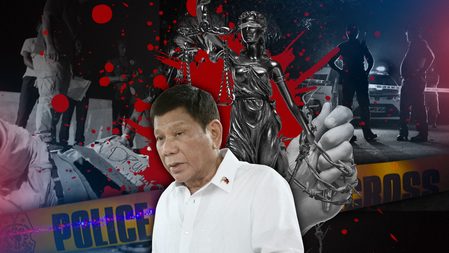
![[Newspoint] Improbable vote](https://www.rappler.com/tachyon/2023/03/Newspoint-improbable-vote-March-24-2023.jpg?resize=257%2C257&crop=339px%2C0px%2C720px%2C720px)
![[Newspoint] 19 million reasons](https://www.rappler.com/tachyon/2022/12/Newspoint-19-million-reasons-December-31-2022.jpg?resize=257%2C257&crop=181px%2C0px%2C900px%2C900px)
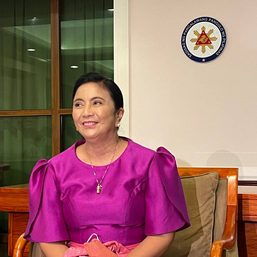






![[New School] Tama na kayo](https://www.rappler.com/tachyon/2024/02/new-school-tama-na-kayo-feb-6-2024.jpg?resize=257%2C257&crop=290px%2C0px%2C720px%2C720px)


![[The Slingshot] Lito Patay’s 4 hours and 38 minutes of infamy](https://www.rappler.com/tachyon/2024/07/Lito-Patay-4-hours-infamy-July-19-2024.jpg?resize=257%2C257&crop=233px%2C0px%2C720px%2C720px)

![[The Slingshot] A Duterte and Bato cop named Patay](https://www.rappler.com/tachyon/2024/06/tl-lito-patay.jpg?resize=257%2C257&crop=322px%2C0px%2C720px%2C720px)


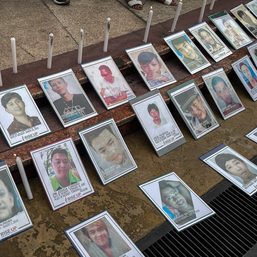
![[EDITORIAL] Sorry Arnie Teves, walang golf sa kulungan](https://www.rappler.com/tachyon/2024/03/animated-arnie-teves-arrest-carousel.jpg?resize=257%2C257&crop=310px%2C0px%2C720px%2C720px)
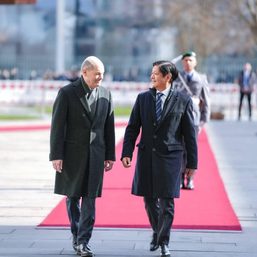





There are no comments yet. Add your comment to start the conversation.